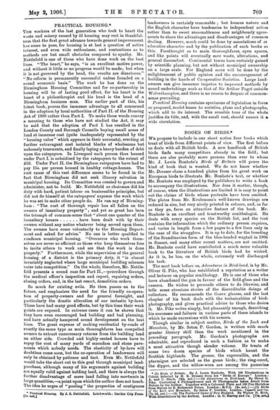PRACTICAL HOUSING.* TrEE workers of the last generation who took
to heart the waste and misery caused by ill housing may rest in thankful- ness that the first great advance towards general improvement has come to pass, for housing is at last a question of active interest, and even wide enthusiasm, and contentions as to methods are but small obstacles compared to apathy. Mr. Nettlefold is one of those who have done work on the best lines. "The heart," he says, "is an excellent motive power, and without it little or no progress would be made; but when it is not governed by the head, the results are disastrous." "No reform is permanently successful unless founded on a sound economic basis." The work he has done on the Birmingham Housing Committee and for co-partnership in housing will be of lasting good effect, for his heart is the heart of a philanthropist and his head is the head of a Birmingham business man. The earlier part of this, his latest book, proves the immense advantage to all concerned in the adoption by local authorities of Part II. of the Housing Act of 1890 rather than Part L To make these words convey a meaning to those who have not studied the Act, it may be said that the adoption of Part I. has resulted in the London County and Borough Counoils buying small areas of land at immense cost (quite inadequately represented by the "housing value" which appears in their accounts), erecting at further extravagant cost isolated blocks of wholesome but uuhomely tenements, and finally laying a heavy burden of debt upon the ratepayers. In Liverpool each person thus housed under Part L is subsidised by the ratepayers to the extent of £56. Under Part H. the Birmingham ratepayers have had to pay 15s. per person housed in healthy cottage-homes. The root cause of this vast difference seems to be found in the fact that Birmingham did not seek illusory salvation in municipal housing. Its Committee was created to govern and administer, not to build. Mr. Nettlefold as chairman did his duty with bard, patient labour on businesslike principles, but did not do himself at the ratepayers' expense the work which he was set to make other people do. He can say of Birming- ham: "The cost of thorough repair has all fallen on the owners of insanitary property " ; and yet so great has been the triumph of common-sense that "about one quarter of the insanitary houses have been dealt with by their owners without any notice whatever being served upon them. The owners have come voluntarily to the Housing Depart- ment and asked for advice." No one is better qualified to condemn municipal housing. "Overseers who work them- selves are never so efficient as those who keep themselves free to incite others to work and see that the work is done properly." Furthermore, while the supervision of the general • housing of a district is the primary duty, it "is almost invariably neglected where large municipal building schemes enter into competition." On the whole, therefore, Mr. Nettle- fold presents a sound case for Part II.,—procedure through the medical officer's inspection and report, repairing orders, closing orders, and, in the last resort, demolition orders.
So much for existing evils. He then passes on to the future, and emphasises the need for the friendly co-opera- tion of property-owners and for general foresight, and particularly the drastic alteration of our inelastic by-laws. These have had many good effects, but by this time their weak points are exposed. In extreme cases it can be shown that they have even encouraged bad building and bad planning, and have actually hampered sound development on the best lines. The great expense of making residential by-roads of exactly the same type as main thoroughfares has compelled owners to extract unnecessary returns from the building land on either side. Crowded and highly rented houses have to repay the cost of many yards of macadam and stone pave- ments which nobody needs. The elasticity of by-laws will doubtless come soon, but the co-operation of landowners will only be obtained by patience and tact. Even Mr. Nettlefold would take the short cut to this goal through municipal land- purchase, although many of his arguments against building are equally valid against holding land, and there is always the further disadvantage of more land falling into mort main in large quantities,—a point upon which the author does not touch. The idea he urges of " pooling " the properties of contiguous
• Practieni Housing. By J. S. N04104014 Letchwoith Gai-den kress. [IL net.]
landowners is certainly reasonable ; but human nature and the English character have tendencies to independent action rather than to sweet reasonableness and neighbourly agree- ments to share the advantages and disadvantages of common dealing. However, much could be done by associations of at educative character and by the publication of such books as this. Forethought as to main thoroughfares, open spaces, and like points will eventually save waste, alterations, and general discomfort. Continental towns have certainly gained by scientific planning, but not without municipal ownership on a large scale. For England more will be done by the enlightenment of public opinion and the encouragement of building in the hands of Co-operative Societies. Large land- owners can give immense impetus to improved methods by sound undertakings such as that of Sir Arthur Paget outside Wolverhampton, and there is no reason to despair of common- sense prevailing.
Practical Homing contains specimens of legislation in force or proposed, model leases to societies, plans and photographs, which add to its interest. The sensible tone of the whole justifies its title, and, with the small cost, should ensure it a wide circulation.








































 Previous page
Previous page